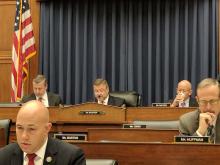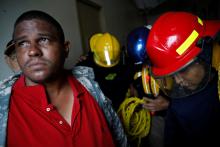hurricanes

On Nov. 19, Federal Emergency Management Agency Administrator Deanne Criswell sat before legislators on Capitol Hill and defended the agency from accusations that it responded slowly to hurricanes in the southeastern United States and skipped homes with President-elect Donald Trump signs on their property.
Earlier in November, Criswell said in a statement that a FEMA employee who had told relief workers in Florida to skip houses with signs supporting Trump had been fired. (Other employees later returned to those homes to offer the opportunity to apply for aid, Criswell testified.) This revelation came at a time when conspiracy theories about hurricanes were rampant.
1. Scientist Calmly Explain That Civilization Is at Stake if We Don’t Act Now
“The world has already warmed by about 1 degree C and without a global coordinated effort, the world will reach 1.5 degrees in as little as 12 years. ‘Several hundred million’ lives are at stake, according to the Intergovernmental Panel on Climate Change.”
2. To Protect the Environment, Buddhist Monks Are Ordaining Trees
To harm an ordained monk is a religious taboo and legal offense. An ordination extends this sacred status to the tree. Communities that ordain trees often patrol the forest, taking photos of illegal activity and reporting wrongdoers.
1. The Quiet Evangelical Campaign to Help Republicans Hold onto the House and Senate
The Faith and Freedom Coalition, Focus on the Family’s Family Policy Alliance, and more are stepping up their ground game — and spending millions of dollars — to stave off a blue wave.
2. This Is How #MeToo Has Moved the Needle in Churches
In 2014, protestant pastors were surveyed about how they talk about sexual and domestic violence in their congregations. Results were dismal. In 2018, after nearly a year of #MeToo revelations, the survey was conducted again — here’s what’s changed.

The Disaster Recovery Reform Act, also known as H.R. 4460, was approved on Nov. 30 by the House Transportation and Infrastructure Committee and will next move to the House floor for deliberation.
The bill received strong support from both sides of the aisle despite objections that using taxpayer funds to rebuild houses of worship would violate the separation of church and state. Proponents of the measure argue that religious groups, which are often at the forefront of disaster relief efforts, are being unfairly disadvantaged.

WHILE OPENING a star-studded concert for victims of Hurricanes Harvey and Irma, musician Stevie Wonder remarked: “Anyone who believes that there’s no such thing as global warming must be blind.”
These two major hurricanes had just ravaged Texas, Florida, and much of the Caribbean. While scientists are cautious about ascribing causation to any individual storm, they do not hesitate to say that warming waters and altered weather patterns due to climate change will cause many more such destructive events in the future.
As we watched the horrific scenes on our television screens, one thing was clear—the most vulnerable suffer the most.

Seeing this cooperative work leaves me with a deep sense of awe for how humanity can come together. Local communities worked together even before any national or international aid agencies set up shelters. They created plans and networks, and even used Twitter to rescue strangers stranded on roofs. While my heart breaks for the lives lost and interrupted, I see all the ways God is knitting us together through these local responses.
But also, right now, ACT for America, a major anti-Muslim hate group, is meeting in Washington, D.C. Groups like ACT for America aim to marginalize and block whole groups of people from our nation’s religious and community fabric. Both ACT for America and the founder, Brigitte Gabriel, have a long history of promoting policies at the federal and state levels that are intended to manufacture fear of Muslims and promote the false idea of Muslims as a threat to the United States.
1. The Juggalo March Is Not a Joke
"What's unique about Juggalos is that they embrace and throw their class status in everyone's face—they’re flaunting their own disenfranchisement. ...They've recognized that the American dream is unattainable and made new dreams for themselves. That scares people. That scares the FBI. This is not what poor people are supposed to do."

As creation cries out to us, let us listen, let us learn,
let us open our hearts to those devastated by the storms
and open our minds to care for creation.
Did anyone else get the feeling, as we watched weather reporters wave their arms frantically in swirling motions across oversized maps of the eastern seaboard -- with their eyes bulging as they pushed out whole paragraphs without a single breath for a period -- that this was all hype?
Last weekend, as Irene passed over town after town in the mid-Atlantic, memories of Katrina did not materialize. By the time Irene huffed over New York City on Sunday morning, and the flood of the century was actually just a really big puddle in Battery Park and a floating lifeguard stand in Long Beach, my fear had transformed into complacency. From there I became cynical. By Sunday afternoon I found myself watching the weatherman's bulging eyes as he repeated the mantra of the day: "It's not as bad as we thought it would be, but it's not over." And I thought: "Boy, they'll do anything for ratings."
But it wasn't all hype.
When our ideas about nature come primarily from Sierra Club calendars or selected snippets from Thoreau, an east coast earthquake and monster hurricane (in the same week) are powerful wake-up calls.
We modern urban dwellers and suburbanites like our nature contained and manageable: a nice hike in the woods; a pretty sunset on the drive home; a lush, green lawn (chemically-induced, alas)
Sometimes we like nature so much we decide to worship it -- or to make it the medium for our worship of God or the "higher power" we think might be up there, out there, presiding over it all. We've been wounded by organized religion, perhaps, disgusted by its hierarchies and hypocrisies. "I can worship God on a mountaintop," we decide. (Or -- conveniently, happily -- on the golf course).
The captain was the first to smell it. He told us that the ocean didn't used to smell this way. Then, we all smelled it.